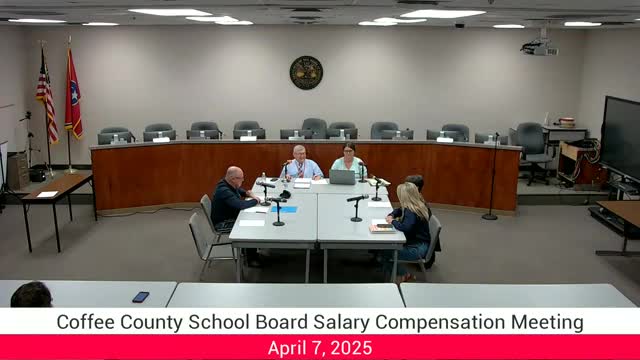Coffee County committee weighs 3% pay plan, asks staff to model 2% alternative
Get AI-powered insights, summaries, and transcripts
Subscribe
Summary
At a Budget and Compensation Committee meeting, Coffee County education officials debated a proposed 3% across‑the‑board raise, a flat dollar alternative and implications of restricted state TISA funding. Staff were directed to prepare 2% and 3% scenarios for the full board.
At a meeting of the Budget and Compensation Committee of the Coffee County Board of Education, committee members debated options for employee pay increases and directed staff to prepare two alternative budget scenarios for the full board to consider.
Committee members focused on how restricted state TISA dollars and the district’s fund balance would affect any raise plan. April, a district budget staff member, told the committee that “the only requirement of TISA is that we spend the $530,000 on certified employees,” and that the remainder of TISA funding can be used for other payroll or building needs.
The discussion centered on three approaches: a 3% across‑the‑board raise (the existing staff proposal), a flat dollar increase (examples discussed included $1,400 per employee or other fixed amounts), and a smaller percentage such as 2%. April said a 3% across‑the‑board raise as currently proposed would reduce the district’s fund balance by about $895,000 under the budget’s worst‑case estimates; the total cost of a 3% increase across all affected positions was estimated at roughly $1.1 million. April also estimated that 1% of pay would cost approximately $350,000 and that 2% would be in the ballpark of $700,000.
Committee members and staff outlined constraints and next steps. April explained that TISA funds are restricted to certified employees (anyone holding a state teaching certificate) and can include classroom teachers, counselors, librarians and district supervisors. She said the district’s March state estimate for formula dollars was $33,460,001.72 and that the TISA component now being discussed was roughly $530,000–$536,372 in the most recent estimates; dividing that estimated TISA amount by the district’s certified count (reported as 372) produces about $1,441 per certified employee if allocated evenly.
Several committee members expressed concern about classified staff and hourly workers receiving a meaningful raise. Staff warned that applying a flat dollar amount to hourly classified employees would require reworking the district’s classified pay schedules and payroll hourly calculations. April said that implementing a flat $1,400 increase for classified staff would be “incredibly hard” on short notice because pay is calculated and budgeted by hourly schedules and by category (nutrition, custodial, transportation, etc.).
The committee also discussed federal funding uncertainty and how that could affect personnel funded by federal grants. Ms. Cole, a non‑voting staff member, said the district is exploring shifting Title IV dollars into Title I where allowed to preserve positions if federal allocations change, but several members urged caution because the final federal numbers are not yet confirmed.
Board member Mr. Gilley emphasized the statutory maintenance‑of‑effort system used to split county local funding among county and two city districts and told the committee that Coffee County historically contributes more than its required local share. He said the county’s fiscal‑capacity calculations and the maintenance‑of‑effort formula drive the local contribution split and that local support has historically been strong.
Action and next steps: the committee advised that April prepare and present two concrete budget scenarios for the full board’s work session—one reflecting a 2% across‑the‑board raise and another reflecting a 3% raise—so the full board can discuss and decide. The committee did not adopt a formal raise motion; members noted the committee’s role is advisory and that any final pay decision must go to the full board.
The meeting also covered a one‑time $2,000 state bonus the legislature provided for classroom teachers; April and another speaker said that bonus is a one‑time payment that does not affect the salary schedule and that final eligibility will be confirmed by state tallying of submitted staff lists.
The committee scheduled presentation of the 2% and 3% scenarios for the board work session so board members can review options before the board votes.
